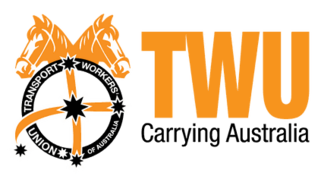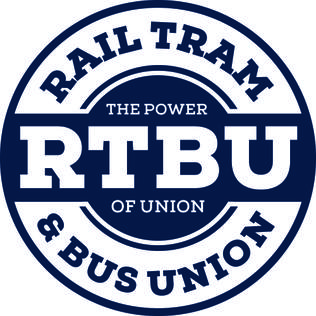Related Research Articles
The Australian Workers' Union (AWU) is one of Australia's largest and oldest trade unions. It traces its origins to unions founded in the pastoral and mining industries in the late 1880s and it currently has approximately 80,000 members. It has exercised an outsized influence on the Australian Trade Union movement and on the Australian Labor Party throughout its history.

The Queensland Council of Unions (QCU) is a representative, an advocacy group, or peak body, of Queensland trade union organisations, also known as a labour council, in the Queensland, Australia. As of 2020, 26 unions and 13 regional branches were affiliated with the QCU. The QCU represents unions covering around 350,000 Queensland workers. It is affiliated with the Australian Council of Trade Unions (ACTU). Its offices are located in the suburb of South Brisbane, Queensland. As a peak body for the Queensland trade unions, the objective of the QCU is to achieve industrial, social and political justice for Queensland workers. The management structure of the QCU is made up of a committee of management and an executive of representatives comprised from affiliated unions.

The Australian Rail Tram and Bus Industry Union (RTBU) is an Australian trade union representing rail, tram and bus workers. The RTBU is affiliated with the Australian Council of Trade Unions (ACTU) and the Australian Labor Party (ALP).

The Australian Services Union is a trade union representing workers in a variety of industries.

The Construction, Forestry and Maritime Employees Union (CFMEU) is the largest union in construction, forestry, maritime, textile, clothing and footwear production. The CFMEU is affiliated with the Australian Council of Trade Unions and the Australian Labor Party.

The Transport Workers' Union of Australia (TWU) is a trade union with members throughout Australia. It has 5 main branches based in: Australian Capital Territory/New South Wales; Queensland; Victoria/Tasmania; South Australia/Northern Territory; and Western Australia.
The National Amalgamated Union of Enginemen, Firemen, Mechanics, Motormen and Electrical Workers was a trade union in the United Kingdom. It represented stationary engine drivers and cranemen in a wide variety of industries, as well as less skilled workers in the electrical industry and miscellaneous workers.
The Australian Railways Union (ARU) was an Australian trade union in existence from 1920 to 1993. The ARU was an industrial union, representing all types of workers employed in the rail industry, excluding locomotive enginedrivers and tradesmen in craft areas.

The Federated Ironworkers' Association of Australia (FIA) was an Australian trade union which existed between 1911 and 1991. It represented labourers and semi-skilled workers employed in the steel industry and ironworking, and later also the chemical industry.
Railway Unions in Australia organised labour of railway employees in Australia operated under federal and State awards - this is a partial list of known unions. Many of the unions amalgamated over time, creating a complex trail of ancestry for some of the later unions.

The Rail, Tram and Bus Union Victorian Branch or RTBU Victoria is the state branch of the RTBU in Victoria. Originally formed in 1993 as the Victorian branch of the Public Transport Union and renamed the RTBU in 1998, the RTBU Victoria today represents nearly 8000 members across Rail Operations, Tramways, Locomotive, Infrastructure and Administrative areas of Victoria's public transport industry.
The Federated Moulders' (Metals) Union of Australia (FMMUA) was an Australian trade union which existed between 1899 and 1983. It represented moulders – skilled tradesmen who fabricated the moulds for casting metal products in foundries. In spite of only organising within a single skilled occupation, which kept total membership low, the vital position of moulders in major industries such as mining, manufacturing and the railways, ensured that the union remained industrially powerful with a reputation for being highly militant.

Federated Amalgamated Government Railway & Tramway Service Association v NSW Rail Traffic Employees Association, known as the Railway Servants Case, is an early High Court of Australia case that held that employees of State railways could not be part of an interstate industrial dispute under the conciliation and arbitration power, applying the doctrine of "implied inter-governmental immunities". The doctrine was emphatically rejected by the High Court in the 1920 Engineers' Case, and in 1930 the High Court upheld the validity of an award binding on state railway authorities.
The Australian Tramway and Motor Omnibus Employees' Association was an Australian trade union, in operation from 1910 to 1950 and from 1950 until 1993. It was founded as the Australian Tramway Employees Union, but was renamed to include bus employees in 1934.
The National Union of Rail Workers of Australia (NUR) was an Australian trade union representing railway industry workers which operated from 1938 until 1993.
The Australian Transport Officers' Federation (ATOF) was an Australian trade union representing salaried officers in the transport sector, particularly in the rail and airline industries. It existed from 1924 until 1991, and was previously known as the Federation of Salaried Officers of Railways Commissioners (1924–1947) and the Australasian Transport Officers Federation (1947–1978). The union had a policy of supporting conciliation and arbitration and against strike action until 1970.
The Building Workers' Industrial Union of Australia was an Australian trade union covering workers in the construction industry.
The Australian Coal and Shale Employees' Federation was an Australian trade union representing workers in the coal mining industry from 1913 to 1990.
References
- 1 2 3 "History". Australian Federated Union of Locomotive Employees. Retrieved 19 January 2018.
- ↑ "LOCOMOTIVE ENGINEMEN". The Sun . No. 3097 (FINAL EXTRA ed.). Sydney. 1 October 1920. p. 5. Retrieved 19 January 2018– via National Library of Australia.
- ↑ "RAILWAY UNIONS". The West Australian . Vol. XXXVII, no. 5, 872. 9 February 1921. p. 7. Retrieved 19 January 2018– via National Library of Australia.
- ↑ "NOTICE OF APPLICATION FOR THE REGISTRATION OF AN ASSOCIATION AS AN ORGANIZATION". Commonwealth of Australia Gazette . No. 78. 30 September 1920. p. 1246. Retrieved 19 January 2018– via National Library of Australia.
- ↑ "UNION DIFFERENCES". Daily Standard . No. [?]76 (SECOND ed.). Queensland. 6 December 1920. p. 3. Retrieved 19 January 2018– via National Library of Australia.
- 1 2 3 "Australian Federated Union of Locomotive Enginemen (i) (1921 - 1926)". Australian Trade Union Archives. Retrieved 19 January 2018.
- ↑ Strangio, Paul, Hart, Paul & Walter, James (2016). Settling the Office: The Australian Prime Ministership from Federation to Reconstruction. Melbourne University Publishing. ISBN 9780522868739.
{{cite book}}: CS1 maint: multiple names: authors list (link)